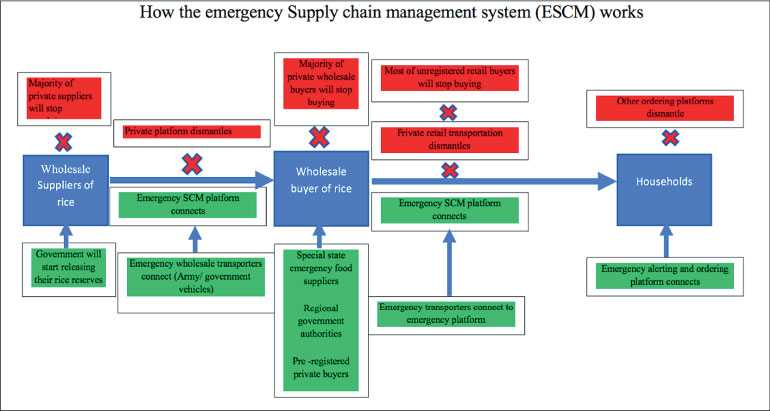Monday Feb 16, 2026
Monday Feb 16, 2026
Wednesday, 29 April 2020 03:05 - - {{hitsCtrl.values.hits}}

Global supply chains are disturbed, dismantled and most have placed a hard pause due to the global pandemic. Social distancing which is the key weapon against the pandemic is successful only when essentials are supplied to the households at their doorsteps while following up regulated health measures, best practices and advice. 
When essentials are not supplied, households will go search for those through most innovative ways even if they are locked down. In a free market economy when demand is there suppliers will start to open their back doors for business even if governments have ordered them to stop operations; and they will not follow any health practice… probably the virus will spread even faster.
However, every prudent country will have their reserves of essentials stored for emergency situations. Especially the farmers as we see on media will have their stocks piled up ready to be sold and shipped. In any other emergencies such as earth-slips, tsunamis, floods, droughts, bush fires or even insurgencies, states will have the support of same supply chain mechanism to respond and distribute stuff quickly and to a greater efficiency.
However, in this pandemic, the first of this scale, the whole modern globalised world is experiencing, the supply chain is broken at many places in every country which has taken the brave decision to lock cities/whole states down. Especially when more and more people become sick the ordinary supply chain will slowly die.
Sri Lanka today
Now what has happened? As a Sri Lankan I will take the example of Sri Lanka today. The Government has essential food reserves while public and private sector wholesalers also had extra stocks of all essentials ready by early March targeting the Sinhala-Tamil New Year in April. Especially, March is one of two main harvesting periods of the year so farmers have stocks and harvest ready to be reaped.
However, as the established supply chain was dismantled, although the stocks are plenty, households are not getting them at the quantities they wanted at normal prices. Supply of other goods than grocery items are completely stopped. The few popular super markets in cities could not handle the number or online orders and the service has become a disaster.
The Government is sending random trucks of essentials through few still existing State-owned companies and co-operative arms (yes that is true because our passport says ‘Democratic Socialist Republic of Sri Lanka’) with no proper target. Standard grocery packages are made by them and sold at a fixed price to the households. Earlier what we bought was what we wanted. When standard packages are sold we buy big quantities of unnecessary stuff just to get a little of most wanted one.
The Government has given special passes to private retailers to go to the households and sell stuff. I see many private trucks, small vans, converted cars and even tuk-tuks are passing-by shouting what they have to sell. Nine out of 10 are not necessary and the same items are sold by multiple people as they are not connected. It has increased the risk of the spread of virus as well because those new mongers we meet now are not familiar and coming from places we have not met people from. Therefore, they can easily become carriers of the virus. For example, a fish monger from an area closer to Colombo was found to be positive for COVID-19 and health authorities are trying hard to isolate households and people whom he has met. From Indian news we know that a pizza delivery boy who is positive had visited many households.
What is the solution?
So, what is the solution? The solution is a software app which can be plugged into the places where the ordinary supply chain is broken with already permitted suppliers including the emergency Government mechanism. Then, all the households with their geo-locations can be registered into system so they can order what they want, when they want, where they want and in quantities which they want.
To explain what I mean by very simply, I am attaching a sketch of the solution. I took the example of supplying rice to the households. I believe that this is a solution the United Nations can step in and enable for poorer countries. I am happy if the Sri Lankan mission to the UN makes this proposal to the Secretariat as coming from Sri Lanka. It will make sure that we are centrally aware of how well each country is doing because one failed country against a pandemic will definitely take it to the world a second round.
How long will it take? This is definitely not a solution we can have now. But for the next pandemic. As we get more and more extreme weather experiences, I believe that pandemics will also become more frequent and we will have to adjust our supply chains within a fraction of time. Development of the solution will not take long but entering master data and initial data feed will. States can use the same mechanism they follow when they do national census to register households.
Some components of the solution can be used in normal conditions also, especially security alerts – calling 911 and waiting till a person answers is inefficient. USA police may be answering fast, but ours do not. Of course, it will help to gather more situational information if a person answers. However, what a victim can do fast is pressing a soft button so that an emergency alert with the geo-location hits the central security room. If the victim has more time, the new generation can type so fast and feed the problem through the app.
Another advantage is the gained capability of monitoring people’s movement under quarantined situations to see whether they follow laws and guidelines. People with more movements can be stopped from such irresponsible movements and quarantined people can be practically pushed to behave with responsibility. As I just mentioned this solution is so versatile and can be extended further.
Happy quarantined life. Stay safe everyone.
(The writer works as the Manager – Process Excellence in GE Transportation, a Wabtec company, and can be contacted via email at [email protected].)